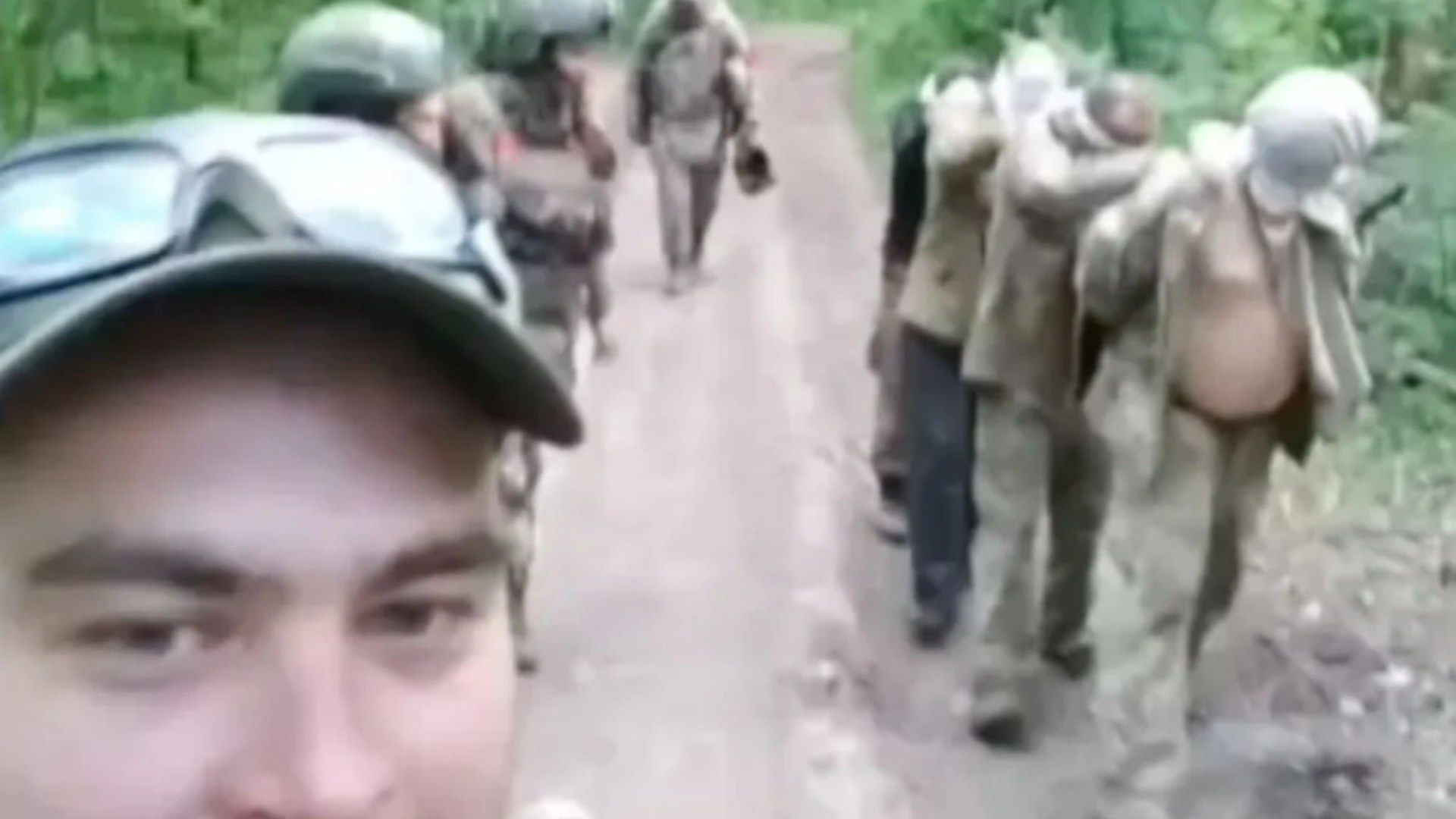
HARROWING footage shows the sick reality of Vladimir Putin’s war in Ukraine, as Russian troops lead Ukrainian prisoners to a mock execution.
Four blindfolded soldiers held captive by Russian troops were filmed as they were beaten, threatened, and marched through a forest near the frontline.
9

9

9

9
As the Ukrainian soldiers marched in a row – gripping onto each others’ shoulders – the five Russian troops tried to make them sing the Soviet national anthem.
One cruel captor kicked the leading Ukrainian in the groin, causing him to fall to the ground, where he was then kicked in the head.
A Russian soldier, reportedly a paratrooper, demanded that the fallen PoW get up, then said: “Looks like we’re gonna have to kill him.
“Do we have to kill him? Hey, get up, get up.”
The cruel fighter raised his Russian army Kalashnikov rifle and shot into the dirt track within inches of the prostrate PoW’s head in a mock execution.
One of the Russian soldiers turned the camera back to his own face after the gun fired and frowned.
The shameless torturers’ faces were uncovered and the video was shared on a pro-war Z-channel on Telegram, claiming that the act was “a bit of a laugh about the Ukrainians… nothing major”.
The Russian channel added that its compatriot solders were “high on adrenaline”, and asked: “Have you been to a battle? Have you lost combat comrades?”
It continued to say the torture was “a bit of a laugh about the Ukrainians, a bit of a joke, nothing major.
“We reminded them about their Big Motherland [the Soviet Union].”
What happened to the Ukrainian men after the recording finished – and the identities of the torturers – is unclear.
Ukrainian ombudsman Dmytro Lubinets said the footage showed Russian soldiers “mocking Ukrainian prisoners of war”.
He said: “According to preliminary information, this happened in the Kharkiv direction, where the Russians are currently trying to conduct offensive actions.
“The video recorded beatings, humiliation, threats, and an imitation of a shooting.
“Unfortunately, such treatment of Ukrainian prisoners of war is not an exception to the rules, but a common tactic for the occupiers.”
The ombudsman added the incident should be recorded as “further evidence of violation of international humanitarian law by the Russian Federation”.
He said: “I sent official letters to the International Committee of the Red Cross and the United Nations so that they would document the fact of abuse.
“This will be another addition to the evidence base for the future tribunal over [war] criminals.
“Russia does not observe any rules of warfare and is not at all shy about demonstrating its cruel and inhumane actions.
“The world must react to hold Russia accountable, otherwise the right of might will defeat the might of right.”
Ukrainian Telegram channel Pravda Gerashchenko vowed that the Ukrainian Defence Forces would find the “scum” “terrorists” who did not bother to cover their faces, or hope for impunity.
The Russian channel which posted the confronting video claimed none of the Ukrainians were injured in the video.
It said: “As for those, who don’t want to die for [Ukrainian President] Zelensky, we are waiting for you with our arms open.
“With love, Your paratroopers.”
Geneva convention on treatment of PoWs

THE Geneva Convention on Prisoners of War, signed at Geneva in July 1929, covers the treatment of prisoners of war during World War II.
It was significantly revised at the 1949 conference; the Third Geneva Convention defines humanitarian protections for prisoners of war.
Specific provisions stipulate prisoners of war must not be subjected to torture or medical experimentation, and must be protected against acts of violence, insults, and public curiosity.
PoWs must be housed in clean, adequate shelter, and receive the food, clothing, and medical care necessary to maintain good health.
They must not be held in combat areas where they are exposed to fire, nor can they be used to “shield” areas from military operations.
The names of PoWs must immediately be sent to the Central Tracing Agency of the International Committee of the Red Cross, with POWs allowed to correspond with their families and receive relief packages.
Seriously-ill PoWs must be returned home, and all PoWs must be released – and sent home without delay – when the conflict ends.

9

9

9

9

9